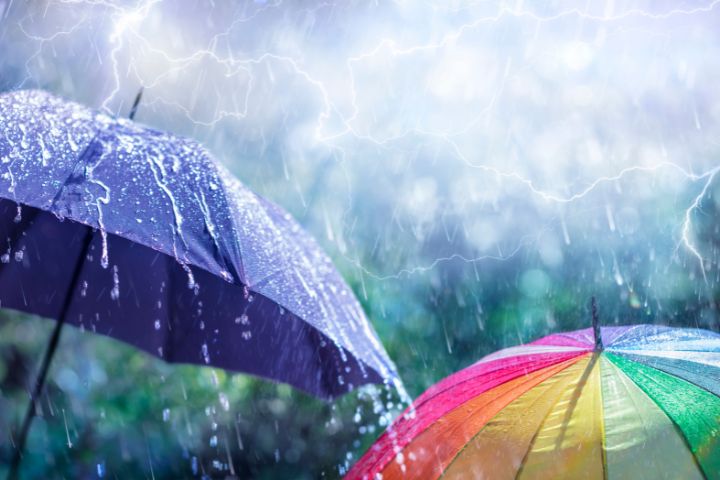

10 things you can do to stay safe during storm season
The storm season is well and truly here, and depending on what part of the country you live in, you may have already experienced some severe weather conditions and power outages this year. However, while it's impossible to avoid storms, there are several precautions you can take to keep safe. Here are our top ten tips to prepare for storm season.
1. Keep yourself informed
To stay informed during periods of severe weather, it's important to keep track of updates from reliable sources like the Bureau of Meteorology. You can also use apps like BOM Weather (available for Apple or Android devices), AUS Rain Radar (available for Apple or Android), or your smartphone’s pre-loaded weather app to stay up-to-date. Plus, your local radio station will provide information specific to your area including flash flooding locations to avoid, road closures, as well as evacuation and recovery centres.
2. Keep an emergency kit close by
It's important to have an emergency kit ready in case of power loss or the need to evacuate quickly. Your kit should include essentials such as water, non-perishable food, medications, first aid supplies, torches, batteries, candles, matches, blankets, and portable phone chargers. You can also add anything else you think might be necessary for your specific needs.
3. Maintain your outdoor spaces with storms in mind
Trim your trees and secure any loose objects, as strong winds can easily turn them into dangerous projectiles. Make sure your gutters and downpipes are clear of any blockages, as these can cause water to overflow into your roof cavity. Also, check that any drains on your property or in the gutter in front are clear so that surface water can disburse quickly. This will help prevent water from pooling and making its way inside your home.
4. Check your roof for damage
After every significant weather event – and at least once a year – you should inspect your roof for any signs of damage. A thorough water blast can help to clear any build-up of dirt and debris that may block drainage channels. Any cracked or damaged tiles or sheeting should be replaced as soon as possible. If you have access to your roof space, it’s a good idea to check inside it. If you see light shining through, it probably means the waterproof membrane has been damaged.
5. Invest in a generator
A generator is one of those things that you don’t need - until you actually do. It may seem like an unnecessary expense, but if you lose power for several days, all the perishable food in your fridge and freezer will spoil, and you’ll need to dispose of it. Having a generator can keep your essential appliances working and may even provide enough power for you to watch some TV while you wait for the electricity to come back on.
6. Be aware of local evacuation shelters
We all think it will never happen to us, but it's always better to be prepared by knowing what to do in an emergency. It's important to get familiar with your nearby evacuation shelters and the best routes to get there. If authorities recommend evacuation, it's necessary to follow their instructions promptly.
7. Stay indoors and away from windows
During a storm, it is essential to stay indoors and away from windows. Keep all windows and doors closed and check every hour for any leaks. Although there's not much you can do to stop leaks during a storm, you can place a bucket or bowl underneath them to prevent flooring damage. If you must leave the house, never attempt to drive through flooded areas, as water levels can be deceiving, and the current may be stronger than it seems.
8. Call emergency services for assistance if you need it
If you experience property damage, such as flooding or a missing roof, or if there is a risk of a tree or branch falling, you can contact your State Emergency Service (SES) for help. You can reach SES from anywhere in Australia by calling 132 500. It's important to remember that this service is provided by volunteers, and during severe weather when demand is high, any requests for assistance will need to be prioritised.
9. Have a communication plan in place
Establish a way to stay connected with your family and friends during and after a storm. Remember, severe weather can strike at any time, so it's essential to think about where your household members may be over a 24-hour period, how you will contact them, and where you can meet up if necessary. Make sure everyone is aware of the plan and designate a central contact person who can pass on messages.
10. Check your insurance coverage
Review your insurance policies to make sure you have sufficient coverage in case of any potential storm damage. With the cost of living on the rise, more and more homeowners are finding it difficult to manage, with some Aussies even cutting insurance from their budgets. However, it is important to carefully consider the pros and cons of this option before making any decisions.
Stay safe this storm season!
Staying safe during storm season is crucial, as severe weather conditions can pose significant risks to you, your family and your property. To ensure your safety and that of your loved ones during storm season, it's essential to be prepared and stay informed. If you're in need of financial assistance to plan for the storm season, we're here to help. Just take a look at our cash loans up to $5,000 to find out how quick and easy it is to get some extra funds. Once a loan is approved, the cash is usually in your bank account within a few hours - so you'll be ready to implement your storm safety plan when needed.